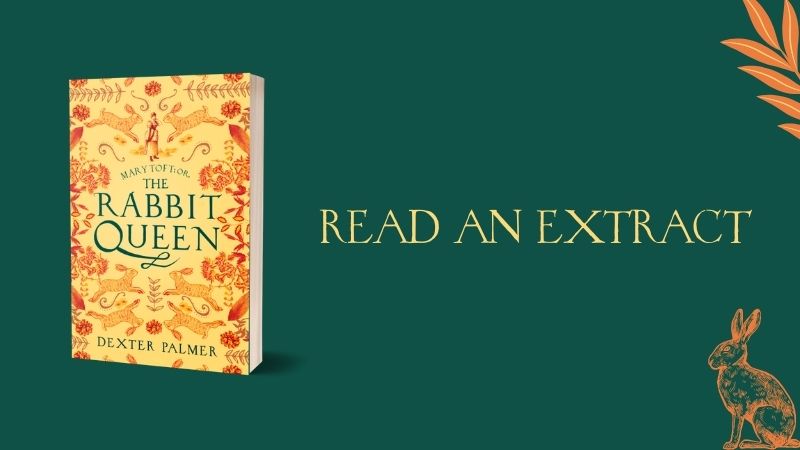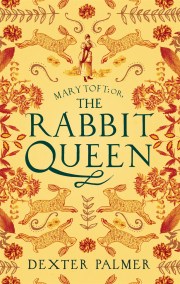Read an extract from Mary Toft; or, The Rabbit Queen by Dexter Palmer

The Exhibition of Medical Curiosities.
The convoy of nine decrepit coaches and wagons that constituted Nicholas Fox’s Exhibition of Medical Curiosities rolled into the village of Godalming on a Friday in early September 1726, soon after sunrise. Its herald, careening headlong before the horses that pulled the lead coach, was a young blond girl whose face was half covered by a port-wine stain, one of her sky-blue eyes peering out of an inky blotch of burgundy. “Tomorrow, witness a series of physiological wonders of which I am the very least,” she proclaimed to passersby, the men and women trudging out of town to begin the day’s harvest of the hop fields. “For the meager price of sixpence, gaze upon the horrific consequences that occur when the Lord God stretches out his mighty finger and lays a curse on Man. Educational for the mind; edifying for the soul.” The windows of the coaches had their thick black curtains pulled, proof against stray glimpses of their passengers. Education and edification would not come for free.
Zachary Walsh, at age fourteen the proud apprentice of Mr. John Howard, Godalming’s finest (and only) surgeon, stood before the window of his loft in the Howards’ home and watched the procession roll by on the street beneath him, imagining what grotesque secrets and horrors might stuff the carriages. Was it not his duty as an initiate into the surgeon’s craft to be medically curious? It was. Granted, even after four months of learning the trade, the sight of blood still turned his stomach. (Just last week he’d tasted bile at the back of his throat while watching Howard patiently stitch shut a gash in a farmer’s calf, laid open by the blade of a wayward scythe. Howard had punched the needle back and forth through the man’s torn flesh as easily as if it were burlap, seeing the blood and not seeming to care. “You’ll be as hardened to this as I am, soon enough,” he’d said, his voice infused with an unexpected melancholy that Zachary couldn’t understand.)
But Zachary’s squeamishness did not preclude a love of mystery, and the drawn curtains of the coaches promised more profound alterations of the human shape than mere swollen stomachs or broken bones. Knowledge of strange, unknown anatomies, yes; sights to steel the spirit against sin as well. But also: nightmares. The most delicious nightmares, the kind that one has only after the wall between the mundane and the magical is breached directly before one’s eyes; nightmares that make you smile as you shiver in your sleep.
As if sensing the turn of Zachary’s thoughts from a distance, the girl with the birthmark spattered across her face left her place at the head of the parade of vehicles and ran back along the train, coming to a stop beneath Zachary’s window. Standing in the street, the last dust clouds that trailed behind the convoy swirling about the hem of her pale yellow skirts, she impishly cast her gaze around her; then she looked up at Zachary, screwed her face into a grimace, and hissed at him as if he were a disobedient cat. “Sssst! Sssst!” Zachary involuntarily stepped backward, briefly fearing some kind of malediction, then feeling foolish because his fear had shown on his face, and she had seen it.
Then, giggling, the girl scampered away, to announce the exhibition’s coming.
Zachary had first met his master John Howard last fall, when his mother had brought him to the surgeon as a patient: the boy had been suffering a constellation of troubles that included a throbbing headache, a throat so sore that each spoonful of porridge he tried to swallow pricked at it with a hundred tiny needles, a voice that had gone half an octave deeper even as he’d become unable to pronounce most words with any clarity, and breath that smelled like the interior of a newly disinterred coffin. Howard listened to Zachary’s mother, Clara, describe the symptoms, then unceremoniously clamped his hand on Zachary’s jaw, commanded him to open his mouth as wide as possible, and peered down the dark tunnel of his throat, involuntarily wrinkling his nose at the dank odor rising from it. “Quinsy,” Howard said to Clara. “There: an abscess beside the tonsil. I don’t think I’ve come across a case like this in two years or more. It calls for scarification, immediately: it won’t disappear on its own. I hope your son is not given to nervousness.” Zachary had a strange pride in contracting a disease that was at least on speaking terms with mortal peril, with a name that had such peculiar music. “Kinthy,” Zachary said, and his mother wiped a glistening strand of drool from his lip with a handkerchief secreted in her sleeve.
Howard dosed young Zachary with a small glass of gin from a clear, unlabeled bottle, instructing him to drink it quickly and pouring him a second as soon as he had forced down the first. It was Zachary’s first experience with strong liquor, and though he suspected that it would have stung his throat only slightly less were he not ill, the mellow fire in his stomach, and the cheerful light-headedness that ensued soon after, began to endear him greatly to John, and quinsy, and the medical profession.
Fifteen minutes later, the boy found himself stretched out on the long, wooden table in the room in Howard’s offices where the surgeon stored his implements and practiced his art. Late-afternoon sunlight shone down on his face through a nearby window. “This will only take a few moments,” Howard said, bending over him, “but you must be still. Open your mouth as wide as possible, once more.” With his left hand, Howard inserted a thin piece of wood into Zachary’s mouth, pinning down his tongue; then, as the boy’s tongue involuntarily squirmed against its restraint, the scalpel in Howard’s right hand slipped past Zachary’s teeth and back farther still, deep into his throat, farther than it should have gone. Zachary felt himself trying to gag, wanting to struggle; he tried not to imagine the only tongue he’d ever had lopped out of his mouth by a clumsy slip of the blade, flopping mindlessly around on the floor like a fish just pulled out of the sea.
“Be still,” Howard commanded in a low voice, and in the few seconds that Zachary was able to relax himself, Howard made three short, sure strokes with the knife. Zachary’s mouth flooded with the sour taste of pus. “Don’t swallow,” Howard said, withdrawing the blade and the stick and offering Zachary a small wooden bowl. “Spit.” Into the bowl went a thick, yellowish-white fluid, shot through with threads of crimson.
“The worst is past, I think,” Howard said to Zachary’s mother, “but the disease may return, in which case the tonsil will have to be removed and the child will have to be bled. Now, Zachary, hold this in your mouth: don’t swallow, as much as you might wish to.” He handed him a third glass of gin. “Spit it out when you return home. Then, twice a day for the next two days, do the same with white wine. One shilling, please.”
Early one morning two weeks later, Howard heard a knock on his front door, faint and timid. He opened it to see Zachary standing there before him, alone.
“I’m well,” Zachary said. “I did what you said, with the gin and the wine. My throat and my head don’t hurt.” His voice had returned to normal, with only an occasional warble that signaled an impending transition to adulthood.
“Then the rarest of specimens darkens my door,” Howard said. “Neither ill nor in the company of the ill. Were it not for those two types of people, I and all my kind would be invisible.” He beckoned Zachary inside.
Howard had found himself unoccupied so far that morning—though a calamity was surely due by soon enough—so he had been keeping himself occupied by struggling with a particularly thorny chapter of John Locke’s An Essay Concerning Human Understanding.
'Palmer spins a cracking tale that, despite its disconcerting subject, is piquantly cheerful and compassionate . . . With empathy and imagination, Palmer explores the master/apprentice relationship, first love and first rivalry, spite and kindness: conjuring a world to raise a wry smile' New York Times
---------------------------------------------------------------------------------
A stunning, powerfully evocative new novel based on a true story - in 1726 in the small town of Godalming, England, a young woman confounds the medical community by giving birth to dead rabbits.
Surgeon John Howard is a rational man. His apprentice Zachary knows John is reluctant to believe anything that purports to exist outside the realm of logic. But even John cannot explain how or why Mary Toft, the wife of a local farmer, manages to give birth to a dead rabbit. When this singular event becomes a regular occurrence, John realizes that nothing in his experience as a village physician has prepared him to deal with a situation as disturbing as this. He writes to several preeminent surgeons in London, three of whom quickly arrive in the small town of Godalming ready to observe and opine.
When Mary's plight reaches the attention of King George, Mary and her doctors are summoned to London, where Zachary experiences for the first time a world apart from his small-town existence, and is exposed to some of the darkest corners of the human soul. All the while, Mary lies in bed, waiting for another birth, as doubts begin to blossom among the surgeons and a growing group of onlookers grow impatient for another miracle . . .







